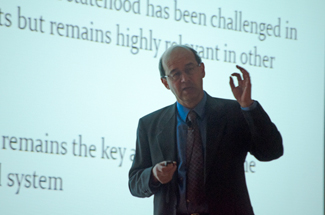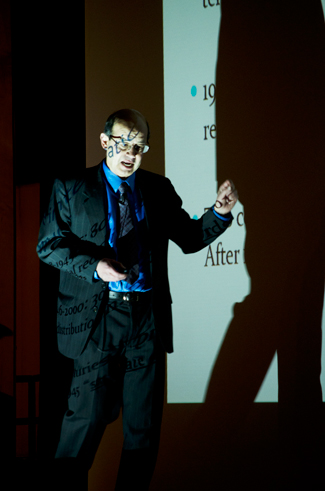Borah Symposium speaker addresses state autonomy
Within the duty of a democratic nation is the responsibility to deal with sovereignty and its many challenges, including a responsibility to intervene and protect other nations outside of a state’s direct control, said Hendrik Spruyt, professor of international relations at Northwestern University.
Spruyt, an expert on political science and international studies, addressed the development of territorial sovereignty Tuesday evening in the University of Idaho’s Borah Symposium.

Nathan Romans | Argonaut
Hendrik Spruyt, professor of international relations at Northwestern University, speaks Tuesday during the 2015 Borah Symposium titled “Troubled Borders: Sovereignty, Disease, War and Refugees.”
The theme of this year’s event was “Troubled Borders: Sovereignty, Disease, War, and Refugees,” and the event consisted of several speeches, discussions and video presentations on the topic over three days.
According to Spruyt, to discuss the power of the state, either internally or outside its borders, it is important to recognize the origin of the state and its relevance in the modern world. Spruyt said nuclear weapons, multinational corporations, religious movements and other global issues effect the relevance of a state’s power, as well as their ability to exercise their power in a given area in or around their borders.
Spruyt explained some of the misconceptions of sovereign nations — that their growing extinction is highly exaggerated, and while there have been challenges toward statehood, they still remain highly relevant in many cases.
After discussing the relevance and existence of sovereign territorial statehood, Spruyt gave the audience a clear definition of being a state, beginning with the Roman Empire and continuing throughout history to create the sovereign states of the modern day.
According to Spruyt, one of the greatest historical challenges to statehood was the harsh division between church and state.
He said some of the biggest issues surrounding sovereignty in history are the emperor versus the pope, and who had jurisdiction over which people and in what territories, which led to the outline of specific territories and a stronger definition of power within those boundaries.
“The king says ‘Yes, I’m supreme, in this kingdom. Where my borders end is where my authority ends.’ And that is a new concept. It’s a territorial understanding of authority,” Spruyt said.
State development continued in Europe during the times of military revolutions, Spruyt said. The ability of a state to mobilize a nation in times of conflict was directly related to the power and success of the state.

Nathan Romans | Argonaut
Hendrik Spruyt, Norman Dwight Harris Professor of International Relations in the Department of Political Science at Northwestern University, speaks Wednesday during the 2015 Borah Symposium titled “Troubled Borders: Sovereignty, Disease, War and Refugees.”
“War made the state and the state made war,” Spruyt quoted from Charles Tilly, an American sociologist.
Spruyt said there are reasons why the state cannot become obsolete. For example, state succession is not in all cases a challenge to sovereignty, he said, if done through an intergovernmental agreement it is the duty of the state and not a challenge to its power.
The challenges of de facto autonomy are unclear and overstated, he said. Mutual recognition and the implementation of fixed borders after World War II are factors that give strength to the state, he said.
Spruyt said there are roles and benefits of sovereign states. For example, preemptive war is justified to create democratic regimes, and preventative war — even before a real threat is posed — can often be justified as well, according to Spruyt.
“Each individual state has a responsibility to protect its population from genocide and war,” Spruyt said.
Katrina Hicks can be reached at arg-news@uidaho.edu